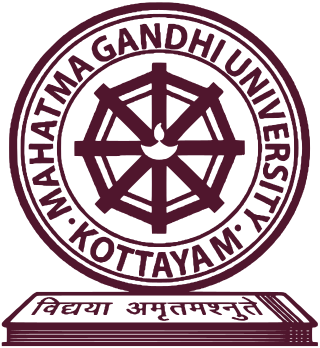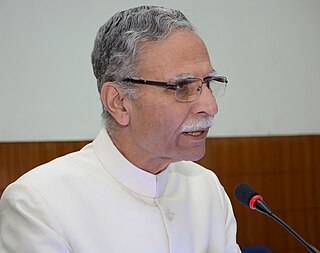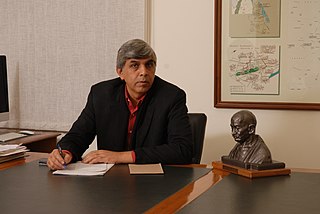
Shivaji University, established in 1962, is a state university located at Kolhapur, Maharashtra, India. The university, with a campus spread over 853 acres (345 ha), is named in honour of Shivaji I. It was inaugurated on 18 November 1962 by Dr. Radhakrishnan, the then president of India. Yashwantrao Chavan and Balasaheb Desai took the lead in establishing this university.

The University of Madras is a public state university in Chennai, Tamil Nadu, India. Established in 1857, it is one of the oldest and among the most prominent universities in India, incorporated by an act of the Legislative Council of India under the British government.

University Grants Commission is a statutory body under Department of Higher Education, Ministry of Education, Government of India. It was set up in accordance to the UGC Act 1956 and is charged with coordination, determination and maintenance of standards of higher education in India. It provides recognition to universities in India, and disbursements of funds to such recognized universities and colleges. The UGC headquarters are in New Delhi, and it has six regional centres in Pune, Bhopal, Kolkata, Hyderabad, Guwahati and Bangalore. A proposal to replace it with another new regulatory body called HECI is under consideration by the Government of India. The UGC provides doctoral scholarships to all those who clear JRF in the National Eligibility Test. On an average, each year ₹725 crore (US$85 million) is spent on doctoral and post-doctoral fellowships by the commission.

Mahatma Gandhi University (MGU), commonly referred to as MG University, is a state owned public university headquartered in Kottayam in the state of Kerala, India. It was established on 2 October 1983 on Gandhi Jayanti day. Mahatma Gandhi University has been approved by University Grants Commission (UGC) and accredited (A++) by the National Assessment and Accreditation Council of India. The university has around 300 affiliated colleges spread over five districts in central Kerala.

Tamil Nadu Open University (TNOU) is an Indian institution for open and distance learning established by the government of Tamil Nadu, India. It was founded in 2002 and is based in Chennai.
The National Digital Library of India is a virtual repository of learning resources, providing services including textbooks, articles, videos, audiobooks, lectures, simulations, fiction, and other kinds of learning media for the learners/user community. It is a project managed by the Ministry of Education, Government of India through its National Mission on Education through Information and Communication Technology (NMEICT). The objective of the project is to collect and collate metadata and provide full text index from several national and international digital libraries, as well as other relevant sources. The NDLI provides free of cost access to many books and designed to hold content of any languages and provides search support for the 12 most widely used Indian languages. It is developed, operated, and maintained by the Indian Institute of Technology Kharagpur.

National Centre for Science Information (NCSI) was the information centre of Indian Institute of Science, Bangalore, that provided electronic information services to the Institute academic community. The Centre also undertook sponsored R&D projects and conducted a training programme on Information and Knowledge Management. NCSI was established in 1983, as a University Grants Commission (India) Inter-University Centre (IUC). Formerly, as UGC-IUC for science information, NCSI provided national level current awareness services to researchers in Indian universities during 1984 to 2002.

Lieutenant General Zameer Uddin Shah, PVSM, SM, VSM is a retired senior general of the Indian Army. He last served as the Deputy Chief of the Indian Army Staff. After retirement, he served for some time as an administrative member on the bench of the Armed Forces Tribunal. He was the vice-chancellor of Aligarh Muslim University.

The Ministry of Education (MoE) is a ministry of the Government of India, responsible for the implementation of the National Policy on Education. The ministry is further divided into two departments: the Department of School Education and Literacy, which deals with primary, secondary and higher secondary education, adult education and literacy, and the Department of Higher Education, which deals with university level education, technical education, scholarships, etc.

Sivanath Sastri College is an undergraduate college for women in Kolkata, India, and is popularly referred to as South City Morning. It is affiliated with the University of Calcutta. The name commemorates the legacy of Brahmo social reformer Sivanath Sastri. It shares premises with Heramba Chandra College and Prafulla Chandra College.

Dr A.R.D. Prasad is an Indian Library and Information Science Academic, Information professional and Information scientist. Dr Prasad teaches at Documentation Research and Training Centre (DRTC), Bangalore as Professor of Library and Information Science and he is retired Head of DRTC, which is India's only proper ischool with a very strong research program. His areas of specialisation include Artificial intelligence-Applications in LIS, Natural language processing, Digital Libraries, Hypertext and Multimedia applications, Institutional repository, Open-source software used in Libraries, Open Access to Information, Semantic Web Technology, Free and open source software etc. His other area of interests are Mythology, Buddhism, Philosophy and Indian History. He is pioneer in the promotion and development of Open-source software used in Libraries and Information Centres in India, Open access (publishing) and Open Access movement. He is visiting Faculty of University of Trento, Italy.
A Library Network is to an interconnected platform of some group of libraries with certain agreements aims to satisfy and fulfill their users' needs. The common objectives of a library network is to acquire and develop unique collection of the each and avoiding the duplication of materials to resolve the budgetary problem. Each library performs sharing of resources to each others on demand basis.
Libraries and Information Centres in India

Sammilani Mahavidyalaya, established in 1996, is an undergraduate and postgraduate college in Kolkata, West Bengal, India. It is affiliated with the University of Calcutta.
The Library is one of the central support services of IIT Bombay. The mission of the Library is to provide information services and access to bibliographic and full text digital and printed resources in order to support the scholarly and information needs of the students, faculty and staff at the Institute Community.

Aligarh Muslim University Malappuram Centre or AMU-Malappuram Campus is one of the prominent educational institution of Aligarh Muslim University in the southern state of Kerala in Malappuram district, near Perinthalmanna at Cherukara. It was established in 2010 by the Ministry of Human Resource and Development, Government of India. The President of India, Pratibha Patel, in her capacity as the Visitor, accorded sanction to establish two centres of Aligarh Muslim University, one at Malappuram and the other at Murshidabad in 2010.

Professor Dinesh Singh, chancellor K.R. Mangalam University is an Indian professor of mathematics. He served as the 21st Vice-Chancellor of the University of Delhi, is a distinguished fellow of Hackspace at Imperial College London, and has been an adjunct professor of Mathematics at the University of Houston. For his services to the nation he was conferred with the Padma Shri which is the fourth highest civilian award awarded by the Republic of India.

Shodhganga : a reservoir of Indian theses is a digital repository of theses and dissertations submitted to universities in India.

In India, the Open Access movement started in May 2004, when two workshops were organized by the M S Swaminathan Research Foundation, Chennai. In 2006, the National Knowledge Commission in its recommendations proposed that "access to knowledge is the most fundamental way of increasing the opportunities and reach of individuals and groups". In 2011, the Council of Scientific & Industrial Research (CSIR) began requiring that its grantees provide open access to funded research, the Open Access India forum formulated a draft policy on Open Access for India. The Shodhganga, a digital repository for theses, was also established in 2011 with the aim of promoting and preserving academic research. The University Grants Commission (UGC) made it mandatory for scholars to deposit their theses in Shodhganga, as per the Minimum Standards and Procedure for Award of M. Phil./Ph.D. Degrees Regulations, 2016. Currently, the Directory of Open Access Journals lists 326 open access journals published in India, of which 233 have no fees.
Aligarh Muslim University: Murshidabad Centre is one of the prominent educational institutions of Aligarh Muslim University. A new chapter of educational enlightenment was added to the culturally enriched soil of Bengal with the establishment of Aligarh Muslim University, Murshidabad Centre in 2010. The Centre, accredited by NAAC in A grade, is empowered by Section 5(2) (C) of the AMU (Amendment) Act, 1981 and under Section 12(2) of the University Act. [Act XL 1920 and AMU (Amendment) Act, 1972].
















